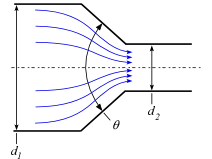Contents
- Index
K_Gradual_Contraction

The K_Gradual_Contraction(d_1,d_2, theta) function returns the resistance coefficient for a gradual contraction having the geometry shown in the figure.
The diameters, d_1 and d_2, are expected to be entered in m or ft, depending on the unit system setting in EES.
Note that the resistance coefficient is defined in terms of the velocity for the smaller pipe, e.g., d_2 as shown in the figure.
For expansion angles greater than 45°, the resistance coefficient is the same as for a sudden expansion.
Example:
$UnitSystem SI K Pa J deg
d_1=0.025[m]
d_2=0.10 [m]
theta=20[°]
K=K_Gradual_Contraction(d_1,d_2,theta)
V_tilde=10 [m/s]
rho=1000 [kg/m^3]
g=g#
h_L=K*V_tilde^2/(2*g)
DELTAP=h_L*rho*g
{Solution
DELTAP=6512 [Pa]
h_L=0.664 [m]
K=0.1302
}
Notes:
EES determines the minimum and maximum diameters. The maximum diameter is assumed to be d_1 in the figure, but it does not matter if they are switched.
Reference:
Flow of Fluids Through Valves, Fittings, and Pipe, Crane Valves North America, Technical Paper No. 410M, 1979
Minor Losses Index
